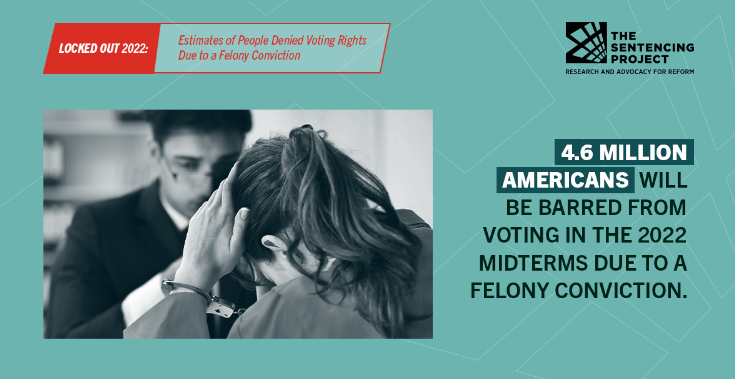Felony Disenfranchisement in the 2022 Midterm - The Sentencing Project
75% of those disenfranchised fully completed their sentences or remain supervised on probation or parole

There are 14 days until the 2022 United States midterm elections, and offices being contested include all 435 seats in the US House of Representatives, 34 of 100 US Senate seats, Governorships in 36 US states and 3 US territories, numerous vital state offices including Attorneys General and Secretaries of State, as well as state and local legislative offices.
Ahead of the election, The Sentencing Project today released a new report which found that 4.6 million people, or one in every 50 adults, will be barred from voting in the 2022 midterms due to a felony conviction. Three out of four of the people disenfranchised are living in their communities, having fully completed their sentences or remaining supervised while on probation or parole.
Furthermore, the report found that although half of U.S. states have scaled back voting restrictions for people with felony convictions, several others – particularly Southeastern states – have retained such restrictions, and their disenfranchised populations have increased with the expansion of the criminal legal system.
Key findings from the report:
- One in 19 African Americans of voting age is disenfranchised, a rate 3.5 times greater than that of non-African Americans.
- More than one in 10 African American adults is disenfranchised in eight states – Alabama, Arizona, Florida, Kentucky, Mississippi, South Dakota, Tennessee, and Virginia.
- Although data on ethnicity in correctional populations are still unevenly reported, the report conservatively estimates that at least 506,000 Latinx Americans – or 1.7 percent of the voting eligible Latinx population – are disenfranchised.
- Approximately 1,000,000 women are disenfranchised, comprising over one-fifth of the total disenfranchised population.
This report makes it clear that millions of our citizens will remain voiceless in the upcoming midterms. Felony disenfranchisement is part of a through-line to restrict ballot access, just like poll taxes, literacy tests and property requirements. It is past time for our country to guarantee the right to vote to all people with felony convictions.
You can download a PDF copy of "Locked Out: Estimates of People Denied Voting Rights" from The Sentencing Project.










